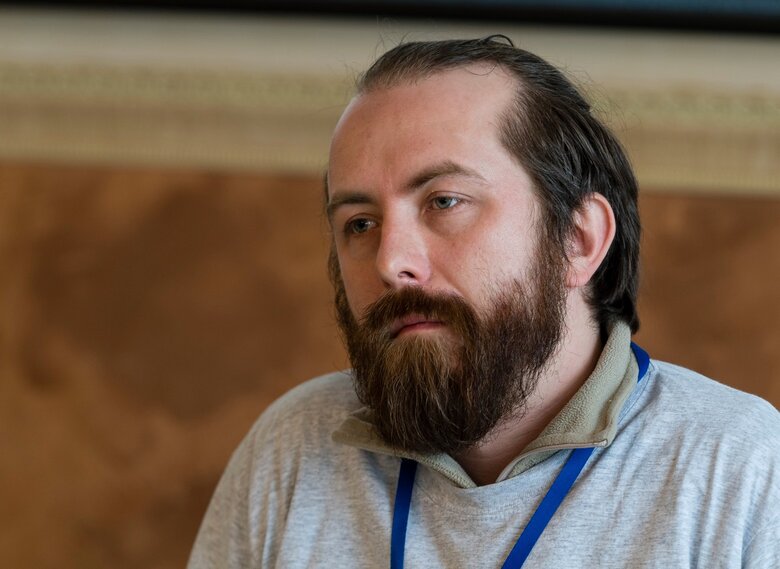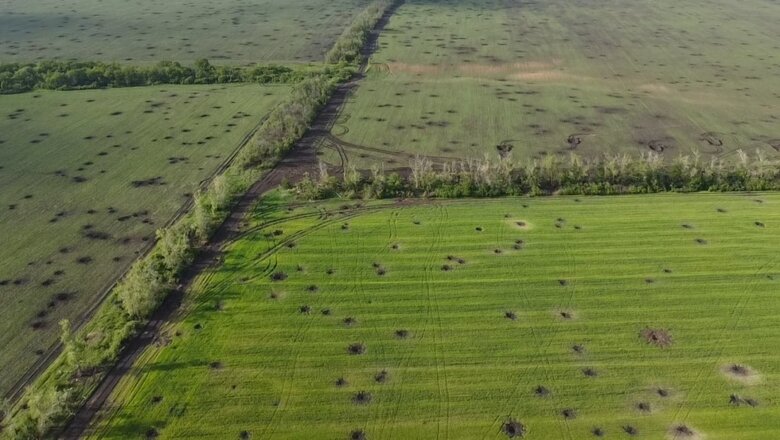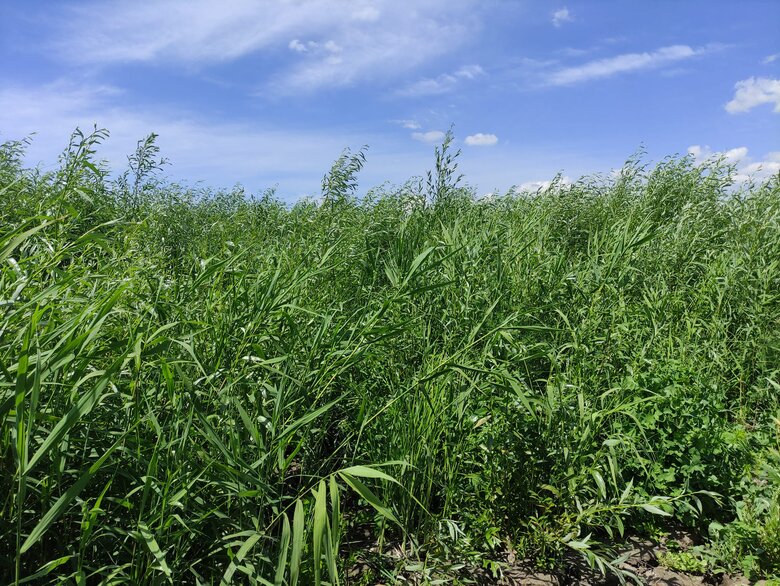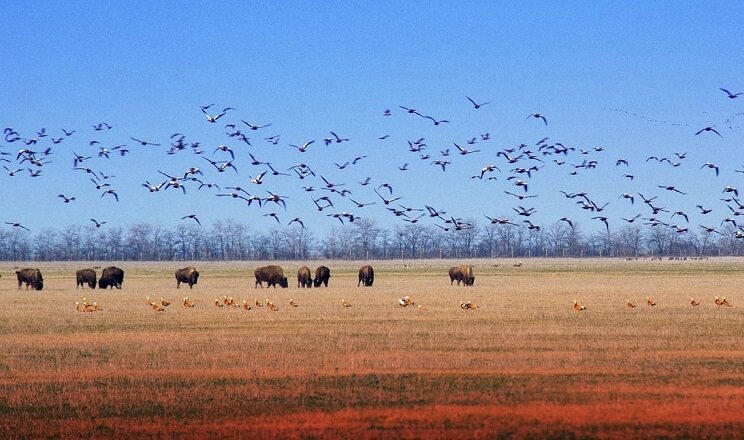I assume that broad front line will become large exclusion zone for centuries, - ecologist Oleksii Vasyliuk
The state of the environment in the areas where the fighting continues is deteriorating. Experts compared the scale of pollution in eastern Ukraine due to Russia’s attack to a catastrophe even before the full-scale invasion. After 2022, the situation deteriorated dramatically, and the map of pollution increased many times over.
Against the backdrop of an active war, environmental restoration is not on the agenda, but we are already feeling the deterioration of the situation. So what to expect, how to act, what fair demands should Ukrainians put before the international community, and what form of reparations from Russia can at least somehow cover the environmental damage?
Censor.NET asked these questions to ecologist, chairman of the board of the NGO Ukrainian Environmental Protection Group, Oleksii Vasyliuk.
- There is a widespread belief that Russia's attack has also caused environmental disasters. It is believed that the greatest environmental damage caused by the Russians is in the occupied territories and the gray zone, but there is also damage on free Ukrainian territory from missile and drone strikes and debris. How critical is this pollution and how much will we feel it?
- The primary consequence of war is ammunition explosions. Even a single shot from an assault rifle has a similar effect. Every shot or explosion is a chemical reaction: the subammunition inside the ammunition detonates, regardless of whether it hits its target. As a result, a substantial portion of the chemicals enter the atmosphere and are carried by wind currents until they eventually return to the earth with rain, potentially affecting areas far from their original location—even other countries. Any unreacted chemical material from the ammunition’s subammunition can seep into the soil. All ammunition has a different chemical composition, making it difficult to determine exactly which substances might be seeped into the ground. In addition, we do not know how much of the chemicals have reacted and what substances have been formed instead. In any case, this is not something that is good for the environment or for us. There is no way to remove it from the soil or the air, where it will also seep into the soil.
- That is, the quality of the environment is deteriorating everywhere in Ukraine because drones and missiles are shot down everywhere and it rains everywhere?
- Of course, it is most concentrated along the front line. Since Russia is using an unprecedented amount of ammunition, there has never been such a large amount of pollution. Since the First World War, several European countries have left as an exclusion zone the territories where active hostilities were conducted. These areas are still not used. Most of them are in France. The French believe that it is even dangerous to go there, not to mention farming. The current war is often quite equal in scale to the First World War, and this will not allow many areas to be used again.
Fires are the second biggest challenge. In times of war, no one extinguishes natural areas. Scorched fields can be sown next year, but if forests that have been growing for the previous 70-100 years burn down, it will take at least a decade to restore the forest.
The third problem is the construction of fortifications and demining. Russia is quite advanced in the construction of engineering fortifications. In fact, wherever the frontline has moved in any direction, the ground has been dug up. This means that water and soil horizons have been disturbed. It is naive to imagine that all this will be simply buried. There are remnants of ammunition and mines, so this is also a decades-long job.
Let's say we believe the Cabinet of Ministers that demining will take 70 years. This was a statement as of 2022, after which most of the military events actually took place. In reality, demining will take more than 100 years, and during this time there will be centenary trees. Who and how will search for mines under the roots of centuries-old trees? Therefore, I assume that the broad front line will become a large exclusion zone for centuries.
- If you were asked directly by an ordinary Ukrainian whether it is possible to swim in rivers and lakes, what would you say?
- You have to understand where? Even if I were asked if it was possible to grow something in the garden, I would ask: have you done a chemical analysis of this particular plot, not even the neighboring one, but this particular one? Remember how many news stories there are about a farmer or a forester who blew up on a mine. And what was the farmer doing in an unmined field? It's not even about whether the level of contamination of the field allows you to grow something there, and it hasn't even been cleared of mines yet. There is no point in talking about the quality of products from this field at all.
No one conducts such studies, in part because it is very difficult and expensive. In this regard, I have some questions for some partner countries. They are afraid to give us weapons or money for ammunition. However, they could help with chemical laboratories to find out the condition of arable land where it has already been demined.
- Have there been any such requests from Ukraine?
- I have not heard about it.
DEMINING DOES NOT MEAN CLEARING THE LAND OF CHEMICALS
- There are many organizations that provide demining services. There are also international funds, and they compete with each other. If you look at their websites, almost all of them refer to demining as explosive ordnance clearance. This is very misleading to the community.
For example, a community - ordinary people who want to live - finds some office that provides services for explosive ordnance clearance. Let's say they really neutralize something that can explode. However, people perceive this as a complete cleanup, but it is impossible to clear up from chemicals. Some of them can be neutralized by planting special plants, and some will lose their properties in many years, but this will not happen soon.
But today, because of this substitution of concepts, contaminated fields are being cultivated. I've never heard of a case where it was decided not to cultivate a mined field because it was chemically contaminated territory.
And when we buy Ukrainian products, we don't know where they were grown. Personally, I try to buy food for my family from those regions where nothing has likely exploded. And I would hold back on the good news like "we can eat Kherson watermelons again". But for people, this is euphoria.
- And emphasizing our strength in particular...
- We are strong, but we will live less because we consume poisoned food. Because of the total stress, we will all live less than we could. So I would at least like to have a guarantee that I am not shortening my life by buying Ukrainian products. And such a guarantee can only be given if I know that they are grown only where it is allowed after analyzing them. Instead, we are really at risk of shortening our lives not because of Russian shaheds coming, but because of consuming products from contaminated soils. Moreover, let's take the relatively quiet Chernivtsi region. It is currently the cleanest region, but people there buy the same products in supermarkets as the rest of Ukraine.
- In addition to personal safety, what you have said is very damaging to the image of Ukraine as a "breadbasket". If we don't take care of this now, in the future we will lose the opportunity to use large areas of arable land, and thus this Ukrainian status will be lost?
- The state must act. I would not trust those who want to make money on this - both on demining and on the sale of products, the same grain. There must be some kind of decision not to sell products from the territories where the fighting took place until specific state-licensed research is conducted, but so far there is no such decision. At this stage, the price is not very high - part of the Kherson, Mykolaiv and Kharkiv regions, from where Russian troops were pushed back? This is a small percentage. But when everything is de-occupied, that's when the price of the issue will rise very much.
- Parts of the Kyiv region have been liberated. Sumy and Chernihiv regions were not affected as much? There is no question of analyzes there?
It’s not as critical there. For example, near Izium, we counted 4,000 shell craters per square kilometer. That means there’s a new crater every 5-7 meters. I can’t even imagine how one would physically restore the ground. But even without that, the pollution is so severe that you don’t need to be an expert to be afraid. Simply put, the crops grown there are practically missile dust."
The road to Izyum. Photo: Roman Ratushnyi
But an average Ukrainian should not be an expert in this matter; we need to get this information from the state. Currently, there is simply no such information. And there is no process.
- Is this a question for the Ministry of Environmental Protection and Natural Resources?
- Perhaps not. There is also the Environmental Inspectorate and the State Service of Ukraine for Food Safety and Consumer Protection, which are not subordinated to the Ministry of Environment. In addition, there are local governments that lease land to farmers and are actually complicit in deception, i.e., in not informing citizens in good faith. However, it is the communities that could stop this.
- This is a huge loss for farmers and grain traders, who have already suffered greatly.
- No doubt about it. But there are other Ukrainians who consume buckwheat, oil, potatoes, and so on. So why should we care about the losses of this farmer if his products shorten my life? Maybe this farmer doesn't even think he's doing anything wrong, but that doesn't change the point.
POLLUTION IN THE BLACK AND AZOV SEAS WILL CONTINUE TO INCREASE FOR CENTURIES TO COME
- What is the impact of pollution on groundwater?
-Groundwater is replenished primarily by rainwater, and some of the chemicals from the soil and atmosphere will be leached out, ending up—or already present—in rivers. Plants can also absorb these chemicals from the water. Ultimately, pollution will accumulate in the seas. In Ukraine, all rivers except the Western Bug flow toward the Black and Azov Seas. Even if the war were to end at this very moment, sea pollution would continue to increase for centuries to come."
- So we will have a dirty sea now... What about other Black Sea countries? Will the pollution be distributed evenly or will the beaches of Bulgaria and Romania be cleaner?
- The sea is a common reservoir, and any pollution will spread over the entire sea surface to wherever it is moved by sea currents. If we talk about the pollution associated with the Kakhovka tragedy, it was outside Ukraine within 14 days after the dam was blown up. And further, sea currents can carry pollution to the Sea of Marmara and the Mediterranean. At least the Kakhovka pollution reached the Sea of Marmara. This means that Romania, Bulgaria, and Turkey are also being harmed. It is not a fact that the sea currents will reach Georgia, but no one has studied this and no one is talking about it publicly.
- Are there any technologies to clean the sea? For example, to introduce special purifying algae or plankton. Organic pollution will be "cured" by the sea's self-purification, but what about toxic substances that may be found in fish and shellfish?
- That's what the sea will definitely not be able to clean up. At least I am not aware of such technologies.
- Clear-cutting of a forest is carried out under the slogan "for defense purposes," but no one checks whether this is really the case. As for the problem of forests, they suffer not only from fires but also from clear-cutting of a forest.
And unfortunately, not only Russians are cutting down wood for fortifications. It's clear that everything is for the sake of victory, but is there any control over this from our side?
- They are really being cut down by both sides. The only thing is that Ukrainians cut down forests legally, while Russians simply destroy the remaining forests in eastern Ukraine. But in fact, during the war, control over both deforestation and other natural resource use has been greatly reduced, so we don't actually know how much more illegal deforestation has become. A lot of deforestation is carried out under the slogan "for defense purposes," but no one checks to what extent this is really true. Unfortunately, the tremendous decrease in control over the events taking place in the rear is one of the biggest problems associated with martial law.
EVERYONE IS THINKING ABOUT ENVIRONMENTAL RESTORATION AFTER THE VICTORY, BUT OUR PARTNERS COULD HELP US IN THIS REGARD RIGHT NOW
- Environmental groups often say that the current environmental damage is even worse than Chornobyl. Why?
- After the Chornobyl disaster, people left, and this is their tragedy. And nature continues to develop perfectly, the only thing is that we cannot use those lands for economic purposes. That is, there is no scorched land there, but in the east and south of Ukraine there is. In other regions, it will not be felt as much.
This war is the most documented of all known wars. No one has articulated the environmental consequences so actively. But the consequences of the First and Second World Wars are also very large, including in Ukraine. We just didn't think about it before. We used to walk in the forest along the remains of trenches or craters. However, the Ukrainian land has never known such a concentrated chemical impact due to the war as it is now. This is despite the fact that the Russians, fortunately, do not use chemical weapons on a large scale.
- You emphasize the importance of the fact that UNESCO condemned Russia's crimes in Ukraine, including those committed against the environment, even though this condemnation came too late, only in the summer of 2024. You also described your meeting with Greta Thunberg as a chance to reach out to the world, because there is no help as such. Why was there little help from the allies in terms of the environment?
- The number one issue now is to stop Russian aggression. For Ukrainians, this is a matter of territory and our lives. Other countries have different motivations - some help us out of humanity, others are afraid of a nuclear war. But all the talk about international support does not revolve around environmental issues. They talk about arms supplies, energy support, the need to survive the winter...
There is an international working group that operates at the highest level, which includes Andrii Yermak and leaders of environmental thought. What is decisive is that it includes the environmental ministers of all the most developed countries in Europe. This group has created a document called "Environmental Treaty for Ukraine," which is available on the President's website. This is a kind of political statement that Ukraine and its partners want Ukraine's recovery to be as environmentally friendly as possible. It seems that we are talking about a recovery that has not yet begun. Excuse me, but what about now? Farmers are already blowing themselves up on mines or selling us contaminated grain. Forests are already burning.
That treaty has a nice, beautiful text, spelling out the obligations of Ukraine and the other signatories. There is little to be gained from us now, because we are in the middle of a war. But where are the actions from our partners? Has any signatory state done anything to fulfill this agreement? I think not, and the reason for this is that everyone is thinking about recovery after the victory. And if there is no victory, they will restore something somehow.
FOR THE FIRST TIME IN THE HISTORY OF ASKANIA NOVA, RUSSIANS ALLOWED MANY FIRES
- Tell us more about the Kakhovka reservoir case. This is a huge tragedy that international organizations could no longer ignore. UNESCO condemned Russia after this terrorist attack. On the other hand, we see the actual restoration of the Great Meadow.
- This is the only good example of something good being created in place of what was destroyed. A wonderful forest is being restored there, similar to the one that was there before the reservoir was built. It has already become the largest forest in steppe Ukraine. It may even become the largest nature restoration project in Europe. Everyone is already talking about it, including at the international level. At first, people were skeptical that everything would dry up, but now there are trees 5 meters tall.
Photo by Ivan Moisienko, Head of the Department at Kherson State University
But no one did anything to revive this forest. Although the Russians caused a huge disaster with this terrorist attack - so many living creatures died, the pollution was incredible - it happened at a time when the poplars were flying down with seeds. We were lucky in this regard.
Many people criticize Viktor Yushchenko, and I like to quote him. Viktor Andriiovych used to say: "God loves Ukraine". I was always waiting for us to see proof that some forces had miraculously helped us. And that's exactly what happened with the Kakhovka reservoir. If the Russians had carried out the attack a week earlier or a week later, the forest would not have recovered.
- There were contradictory statements about the Askania Nova reserve. The head of the Kherson RMA, Oleksandr Prokudin, said that the reserve does not actually exist. But the director of Askania says the opposite. As an employee of the reserve, please clarify the situation.
- Askania was occupied from the first day, it is almost near the administrative border with Crimea. Therefore, within a couple of hours after the start of the full-scale invasion, Askania Nova was in the rear of the first occupation forces.
During the first year of the occupation, Askania remained a Ukrainian island and operated under the Ukrainian flag. It was the only state institution allowed to work by the occupiers. In March 2023, Russia remembered that there was a nature reserve here and put its administration there. All Ukrainian leaders and scientists left the occupied territory and are now working remotely. No one has stopped receiving a salary and being an employee of Askania. The caretakers - about 200 people - remained.
Of course, on the 11 thousand hectares of Askania, there are many wild animals, starting with insects, but there are also those that need care. But what makes Askania special is that in the late 1800s, the founder of the reserve, Friedrich Faltz-Fein, began to bring rare ungulates from all over the world. He had a cool and simple idea: if these animals start to disappear in the wild, there should be a reserve population from which they can be restored. That's why Askania has had unique acclimatized populations ever since. Zebras are not African, but Askanian, bison are not American, but Askanian, and so on.
There are 3.5 thousand ungulates alone. There are also birds. I'm talking about those whose existence is artificially maintained. About 200 caretakers work for this. The animals have to be watered daily by pumping artesian water, the grass has to be mowed and stored properly so that these 3,500 animals can be fed in winter, and so on. These are incredibly important people for Ukraine who remained under occupation.
- What were the losses during the occupation?
- For the first time in the history of Askania, the Russians allowed a lot of fires - more than 10. Fortunately, this is the steppe, and for the steppe, fire is not as critical as for the forest. The animals that live there in semi-wild conditions were not affected. But the first fires in the history of the reserve are significant and a new reality.
The Russians also took out some of the most expensive animals, including Przewalski's horses, zebras and antelopes. No sane zoo would sell them to Russia for any money, because they are globally endangered species. The Russians stole what was not available to them before for their zoos.
But what definitely did not happen was that they allegedly organized a hunt in Askania. Fortunately, this is not true. In general, Askania, unlike many nature conservation sites, is not damaged and will fully resume its work in the event of de-occupation.
1% OF REAL ENVIRONMENTAL DAMAGE CAUSED BY RUSSIA IS DOCUMENTED
- There is an initiative to collect Russia's crimes against the environment. Tell us more about it and how complete is the information there?
- I am skeptical about this. There is a website called EcoThreat, and certain data is collected by the environmental inspectorate and the prosecutor's office and its individual units. You can simply get confused by the number of entities that collect facts about Russia's crimes against our environment. On the one hand, I fully agree that the scale of the problems that have arisen from Russia's actions during the war is much greater than anything we have ever experienced before, including Chornobyl. This is a catastrophic scale of environmental destruction.
However, what is being documented is such a drop in the bucket that several problems arise. Problem 1: What is the point of documenting 1% of what we can document? Environmental groups are not in the areas where real hostilities have taken place or are taking place, so no one has documented anything there. It is also impossible to document after the fact. For example, how the air was polluted.
Secondly, even if everything is documented, it will be such colossal losses that there is no such money on our planet. Now they are talking about 13 billion (this is an estimate of the destruction of oil depots and some other pollution at the beginning of the war). Compared to the fact that a quarter of our country will be inaccessible due to pollution, this amount is just a laugh. That's why no one will pay us compensation.
Finally, I am skeptical in principle about the calculation of the amount of damage to the Ukrainian environment caused by Russia. The Geneva Convention prohibits, in principle, waging war in such a way that it causes damage to the environment. Accordingly, Russia has committed one crime in this regard - it has conducted military operations in a way that harms the environment. At the same time, the Russians are doing this intentionally. That is, there is only one crime, and all the nuances are simply its characteristics.
My colleague came up with a different solution. Ukrainians have lost a huge amount of territory that they used and loved. It will take centuries to restore it. And the normal compensation that we can get, is if after the war, when Russia finally loses, Russia has to give Ukraine a similar area for temporary use by Ukraine – in its southern or western regions with the same climatic conditions. And Ukrainians will use it for several centuries, during which time Russians will restore the land they have destroyed in Ukraine. This will be a solution that will not have a financial equivalent but will allow us to receive compensation.
Olha Skorokhod, Censor. NET






